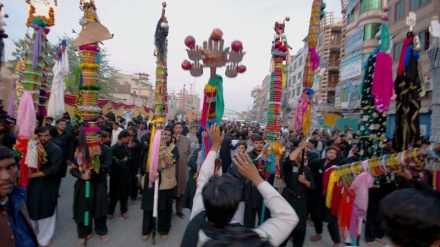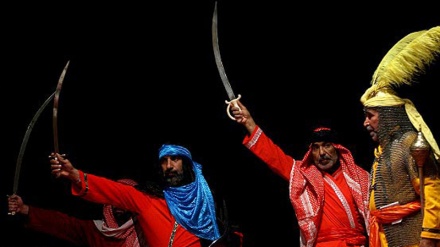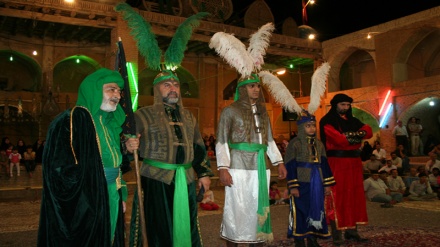Muharram mourning traditions in different lands - 23
Today we will focus on Muharram mourning ceremonies in Indonesia and Malaysia.
In Indonesia, Muharram is commemorated in its unique way with the blending of local culture and customs. It is known as a “Tabuik”, which is popular among the Minangkabau people in the coastal regions of West Sumatra, particularly in the city of Pariaman.
"Tabuik" refers to the towering funeral biers carried around during the remembrance procession, and the practice of immersion of a tabuik into the sea has taken place every year in Pariaman on the 10th of Muharram since 1831. The practice was introduced to the region by the Shi'ite Muslim troops from India who were stationed—and later settled—there during the British rule.
They were known as “sepoy” which is a corruption of the Persian term “Sepahi” for soldier. The commemoration includes reenactments of the Battle of Karbala, and the playing of tassa and dhol drums. Nowadays most inhabitants of Pariaman and other southeastern Asia areas hold similar festivals which are even marked by non-Muslims.
Tabuik is actually a corruption of the Arabic word “Tabut”, which means chest and is used for coffin also. In the holy Qur’an God refers to the Ark of the Covenant, which is called Tabut as-Sakina. The tabuiks in Indonesia are made from bamboo, rattan, and paper.
Shi'a Muslims in Indonesia represents a small minority, and officially are said to number over one million Indonesians, although many more Indonesians have recently become Shi’as secretly. Many of the Indonesian Shi’as are concentrated around Jakarta. They are also found in areas of Java, Madura and Sumatra. The history of Shi’a in Indonesia started in the ninth century, over a millennium ago.
Amongst the early Shi’a Muslims in Indonesia were the grandchildren of Ali son of Imam Ja’far as-Sadeq (AS), the 6th Infallible Heir of Prophet Mohammad (blessings of God upon him and his progeny). Many of these Arab Muslim migrants married the daughters of local Indonesian kings, thereby obtaining high office. Banda Aceh in Acheh, in the north of Sumatra, was the original centre for Shi’a Muslims in Indonesia; it was from there the Shi’a faith spread across Indonesia, along with the commemoration of the tragedy of Karbala, and the mourning ceremonies of Muharram.
Today, among the Indonesian communities which practice Shi’a Islam are segments of the Hadhrami, or people whose origin was from Hadhramout in Yemen, and who are known till this day as Arab-descended Indonesians. They are found in Malaysia as well. Another group are the Shi’a Muslims of Pariaman and Bengkulu in Sumatra, as well as Sigli in Aceh, who claim descent from Indian “sepoys”, and are known local as orang sipahi or orang Kling. The orang sipahi traditionally practice the tabut ritual, though in Aceh it has been banned since 1953.
In Kowal (or Kuala), there is a large Shi’a Muslim population. On 2nd September 1960, fifteen years after Indonesian independence, the government established a university in Kowal naming it Shi’a Kowal University, known in the local Indonesian language as “Syiah Kuala University or Universitas Syiah Kuala).
The origin of the Tabuik ceremony is believed that this tradition was brought by a group from Arabia who were followers of the Ja’fari School of Jurisprudent, as the adherents of the Prophet’s Ahl al-Bayt or Blessed Progeny, are known, and also called Shi’a Muslims.
The mourning ceremonies start with the advent of the month of Muharram. On the tenth day of Muharram, that is the anniversary of the heartrending tragedy of Ashura, people in Pariaman traditionally gather to see the tall handsomely decorated tower, symbolizing a funeral structure where the replica of the coffin of Imam Husain (AS) would be rested on the day of mourning.
Each year in Muharram, the local people commemorate the tragedy of Karbala in their own peculiar way, and the events also attract a large number of Sunnis, as well non-Muslims. From all of ten days, each day there is a very sacred event. Starting from the making of Tabuik shaped like a coffin and bouraq until the release of Tabuik to the beach.
Following the victory of the Islamic Revolution in Iran, and the enlightenment that it brought to many people in Southeast Asia, many Indonesians and Malaysians, have become mainstream Shi’a Muslims. After visiting Iran and Iraq, they have started formal mourning ceremonies in Muharram for the Martyrs of Karbala, despite the adverse propaganda of Wahhabi seditious grouplets.
MD/AS/SS


